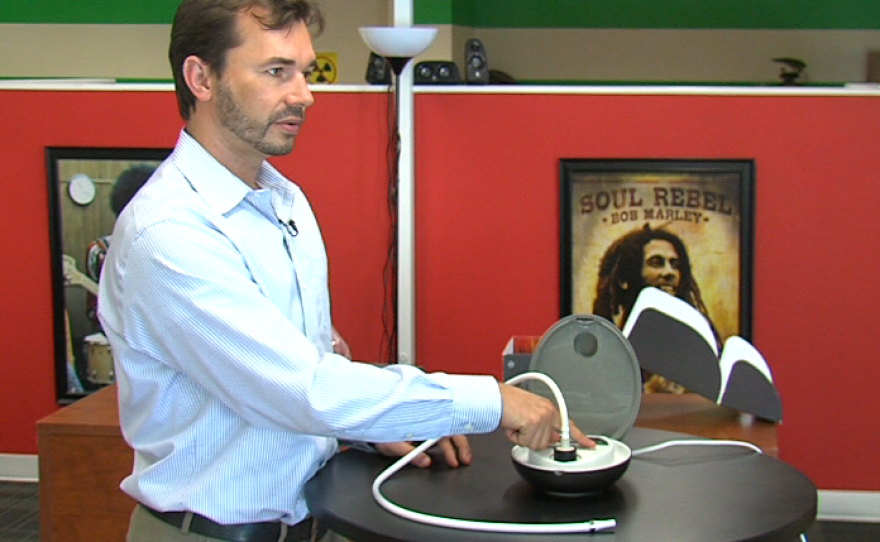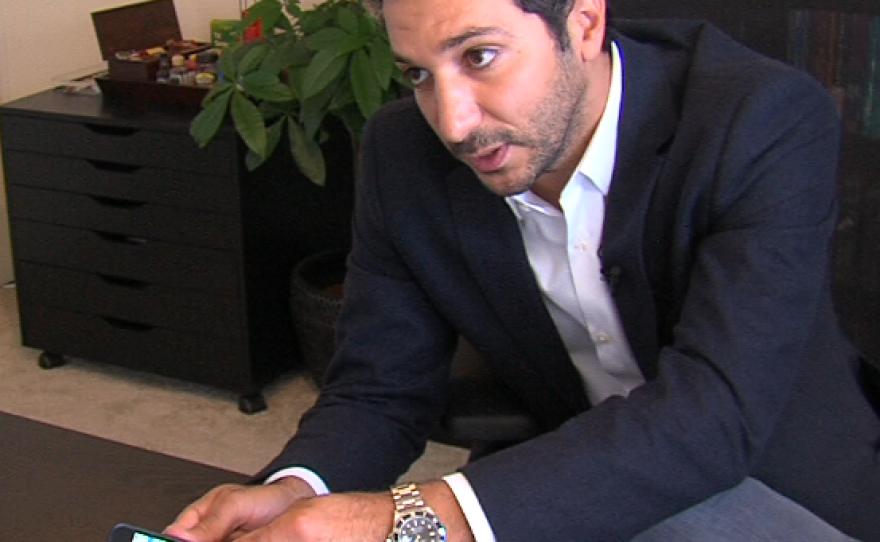It's no secret. There's money in marijuana. But until very recently, breaking into the pot industry meant having to break the law. And even now — with marijuana fully legal in two states and partially legal in many others — businesses striving for legitimacy still risk running afoul of the feds. As a result, even with a majority of Americans now favoring legalization, the companies pushing marijuana's mainstream adoption can't say they're pushing marijuana's mainstream adoption.
Some of those companies have set up shop in San Diego. Magic Flight is one of the most successful. They make a popular vaporizer in a nondescript Midway district warehouse. If you're picturing something like an e-cigarette vaporizer, scratch that image. Magic Flight's Launch Box works with dry herbs instead of liquid concentrates. It's wooden, shaped like a matchbox, and small enough to hide in the palm of your hand.
Magic Flight's founder Forrest Landry isn't your typical startup CEO. He's a very mellow guy who wears his hair in a ponytail. He prefers doing business low to the ground, sitting cross-legged on floor cushions instead of an office chair. Maybe the biggest difference between him and other startup founders is that Landry can't market his device directly to the people most likely to buy it.
"There's so many reasons that's not a good idea," he says. For legal reasons, Landry can't say what most customers buying Launch Boxes already know. This vaporizer is for pot. People use it to get high. If Landry said that, he'd be advertising his vaporizer as drug paraphernalia, basically inviting the Drug Enforcement Administration to step in and shut down his business.
"I feel that there's a need to be able to talk about these kinds of things," Landry says. "Obviously we can't make very many claims. We're trying to promote a sense of awareness without necessarily entangling ourselves."
Landry finds himself in the same position as so many others in this budding industry. He may be helping to change the face of marijuana, but he has to do it all based on a kind of open secret.

Across town in Little Italy, another San Diego startup makes a high-end vaporizer called the Herbalizer. CEO Josh Young is eager to let me try it out — on some less potent plants, of course.
"We've got some eucalyptus, we've got some lavender, we got some peppermint, we've got some sage," Young offers.
The Herbalizer is bigger and more expensive device than Magic Flight's portable vaporizer. But Young says it gives users a more hands-on experience, such as letting them fine-tune the temperature at which they want to vaporize.
"With very controlled temperature, you can specifically extract certain compounds from the plant," Young says.
For instance, let's say — I don't know — a plant like marijuana! Pot's active compounds vaporize at different temperatures. So, changing the temperature can change your high.
"Well it's not for that," Young objects. "But it can be used for any herb."
Magic Flight, Herbalizer and lots of other companies are willing to float into this legal gray zone right now because they see huge demand for better vaporizers. Many consumers find it healthier, more efficient and much more discreet. With vapor almost odorless and devices easily concealed, users can often get away with vaporizing in public.
I wondered if anyone in this industry would go on the record admitting that's what their customers are doing with this stuff. Then I met Daniel Yazbeck.
Describing his company's product, Yazbeck told me, "We have various applications. One of them is for cannabis."

Yazbeck's company doesn't make a vaporizer. They make MyDx, a pocket-sized sensor that hooks up to your smartphone, telling customers what's really in strains with vague names like "Blue Dream."
As a medical marijuana patient himself, Yazbeck knows the industry's lack of standardization first-hand. "I buy a Blue Dream here and Blue Dream there. It's not the same," he says. "It's not the same feeling. So what am I supposed to do?"
MyDx aims to give users an easier way to find out. And Yazbeck will tell you flat out it's for analyzing marijuana. Pop a sample in the chamber, and your phone will show the ratio of THC (the compound that gets you stoned) to CBD (the compound with medicinal properties). But MyDx doesn't give them a way to inhale pot.
"At least according to our attorneys, this does not fall under scheduled paraphernalia laws," says Yazbeck. "So I'm comfortable talking about it based on that."
Some market research projects legal marijuana becoming a $10 billion industry by 2018, and lots of venture capitalists want in now.
The people jumping into the business aren't slackers. Forrest Landry from Magic Flight used to build search engines for DARPA — Defense Advanced Research Projects Agency. Herbalizer's Josh Young worked on supercomputers used by NASA. And Daniel Yazbeck's résumé lists major companies like Pfizer and Panasonic.
"I come from the Fortune 500 world," he says. "You get fired if you smoke cannabis in that world."
But Yazbeck feels the winds shifting. He predicts this is all going to be legal in five years. And he thinks people with suits and advanced degrees will be the ones to get it there.






